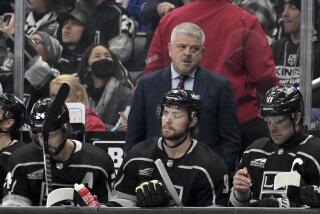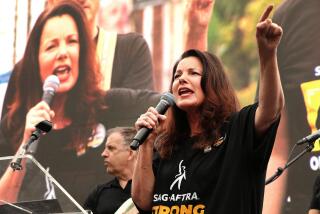Aftermath Figures to Be Worse
- Share via
And now, the deluge.
The accusations. Finger-pointing. Efforts by the NHL to portray the players’ association as deceitful. Efforts by the players’ association to paint the NHL as dishonest and unreasonable.
A pox on both of their houses.
The acrimonious collapse of Saturday’s unlikely attempt to un-cancel the season guarantees there won’t be substantive talks again until September, when training camps normally open, or October, when players usually begin getting paid. There probably won’t be NHL hockey again before January, a lose-lose situation.
“The owners control the piece of the pie,” a source familiar with the negotiations said, “and while it’s true that the players will never get a better deal than they could have today, it’s only going to get worse for the owners. Come September, there’s going to be less money [for everyone]. A lot of it.”
Another valuable commodity -- trust -- has already vanished.
Associates of Wayne Gretzky and Mario Lemieux said the duo would not have jumped into the negotiations on Friday without assurances a deal was possible Saturday. They anticipated playing meaningful roles but were stunned and angry to learn the league had written off the season and that there was no compromise in sight to resume play in 2005-06.
They’re said to be frustrated and feel Commissioner Gary Bettman used them as a shield in a situation he knew was doomed to fail. And neither takes defeat lightly.
NHL sources say the union leaked word that a deal could be done with a cap at $45 million, a level the league never intended to reach. Those sources also say the league was led to believe the union was working on a new proposal, a belief Gretzky and Lemieux shared.
The union made no proposal on Saturday. Sources close to the union say that’s because it was blindsided when the NHL wouldn’t discuss a $45-million cap and wanted to keep it at $42.5 for six years even if revenues grew.
The NHL also didn’t give a minimum payroll number and had reduced revenue sharing to almost nil, acknowledging there won’t be much revenue to share for quite a while after this ends. In addition, qualifying offers were reduced to 75%, infuriating players.
It didn’t have to end this way, not after Bettman nearly broke the union last week.
After the NHL offered to eliminate the link between payrolls and revenues -- which resolved players’ distrust of owners’ accounting -- the union submitted to the salary cap it had told its members was poisonous. They’d already accepted a 24% pay cut and reductions in entry-level salaries and bonuses. Many players were stunned at their leaders’ capitulation and began to doubt Bob Goodenow’s effectiveness.
On Tuesday, the NHL raised its salary cap from $40 million to $42.5 million, plus $2.2 million in benefits. The NHLPA responded by cutting its proposed cap from $52 million to $49 million. Bettman declined to negotiate further, saying $49 million was too rich for too many clubs. He hinted it would be a “magnet” and lead owners back into the same financial bind that’s strangling them now.
Tampa Bay -- which topped 10,000 season tickets after winning the Stanley Cup last spring -- wanted to play. So did Montreal, Toronto, Minnesota, Detroit and the New York Rangers. Eight other clubs didn’t, exactly enough to prevent Bettman from being overruled.
“The process has been hijacked by a group of eight billionaire owners who don’t care one iota about the good of the game of hockey,” a source said Sunday. “Sixteen teams want to play. Those eight have hijacked the NHL.”
Yet, it would have been worth it for Bettman to take the offer -- or for him to have moved up from $42.5 on Saturday in New York, after Goodenow had told players not to go and they told him to stay out of the main meeting.
Had the NHL made a deal on Saturday, Bettman would have been rid of Goodenow as a negotiating foe. If a deal had been closed without him, Goodenow would have had to step aside. Saturday’s failure solidified his power. See, he can tell players, the owners never meant to make a deal. Stick with me. We’ll break them yet.
The NHL has committed a public suicide. It allowed the game to deteriorate, extinguishing the passion necessary to remain a hockey fan in a world dominated by baseball, football and basketball. It alienated its traditional blue-collar audience by pricing tickets out of reach. It expanded beyond its limits and resources, leading owners to depend on expansion fees as income rather than as bonuses to be saved for a rainy day.
The rainy day is here. The NHL had no umbrella.
More to Read
Go beyond the scoreboard
Get the latest on L.A.'s teams in the daily Sports Report newsletter.
You may occasionally receive promotional content from the Los Angeles Times.







